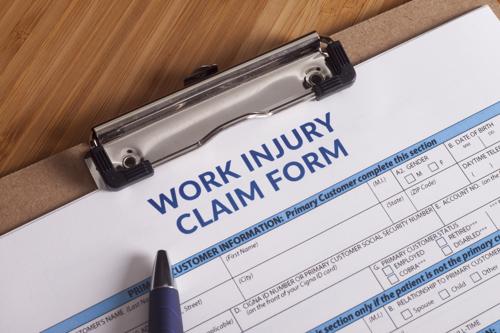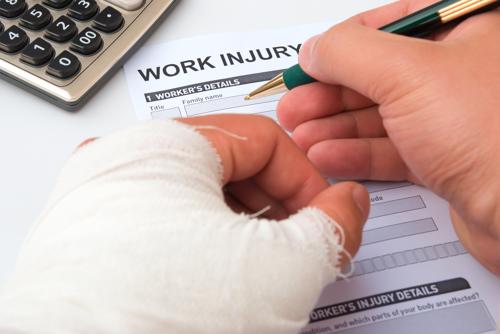Subscribe To Our Newsletter
Menu


A person will receive access to additional medical benefits including vocational rehabilitation benefits if necessary. When filing a workers’ compensation claim, it is important to seek a qualified personal injury lawyer for legal representation such as Pinder Plotkin in Baltimore.
For those filing a claim in Baltimore, it’s important to begin by filling out the relevant claim form. This form will ask for specific information concerning the claimant and what transpired. This can include things such as background information, what type of injury a person is dealing with, where the injury took place, the doctor’s name, how serious the injuries are, and who the employer is. All of this information has to be accurate and it’s recommended to seek legal assistance during this process to ensure the form is filled accurately. The form is only eligible when the rules are followed as expected in Baltimore for workers’ compensation benefits. The lawyer will take the time to go through the form and make sure it fits the definition as listed by the law. This will make sure the claim goes through smoothly and works out for the client.
No, an individual filing a claim cannot receive workers’ compensation benefits and unemployment insurance at the same time. Once the application has gone through for the workers’ compensation benefits, the individual is assumed to be injured and cannot be listed as ready for work. This means unemployment insurance isn’t a possibility and cannot be used for additional compensation. A person that is filing a claim will not be able to work during the time and has to be listed under a temporary total disability to qualify, which means they are medically unfit to do their job.
While looking at the different types of compensation, workers’ compensation law in Baltimore is designed to offer a multitude of options involving permanency. The idea of permanence is to list a specific injury and/or disability that is going to have lifelong consequences on a person’s quality of life and ability to do their job. Permanent Partial Disability refers to a certain period (weeks/months) where a person has a certain disability and cannot do their job as required. They receive 2/3 of their average weekly wage during that period when the claim is approved. This is what permanent total disability and permanent partial disability benefits are all about for those needing compensation for work-related injuries.
To determine whether or not the injury is permanent, the claimant will be asked to seek official medical assistance of their choice. The doctor is then required to provide a detailed rating on their patient’s condition and how impaired they are from a health perspective. This information is used to determine a person’s overall impairment.
The person will also be expected to visit with a doctor as listed by the employer-insurer (IME) and this will be mentioned by their attorney during the proceedings. This doctor will go through a comprehensive examination to assess the injury and offer a rating. In general, this rating tends to be lower than the average but the Maryland Workers’ Compensation Commission takes the time to hear both sides during the hearing. This can also include offering a brief period for both parties to sit down and settle on a single rating. A good example of this would be the claimant’s doctor putting the rating at 20% and the IME doctor listing it at 10%. In this case, both parties can find a middle ground to keep the hearing moving forward.
When it comes to a permanency issue, the Commission will have the authority to decide the case, while the attorneys can begin arguing the rating. In this situation, the percentage used for the claims process is the basis for the amount of compensation a person receives for their injury. This is often multiplied by 2/3 of the claimant’s average weekly wage.
An example of this would be a claimant that is dealing with a shoulder injury and is expected to be compensated for 500 weeks. If the Commissioner concludes that a claimant has a rating of 10% on their impairment, they will receive compensation for only 10% of the 500 weeks (i.e. 50 weeks). The 50 weeks are then multiplied by 2/3 of the average weekly wage.
For a workers’ compensation claim to be valid, it is required to follow established guidelines as deemed necessary by the Commission. These guidelines state the injury must be declared accidental and should remain relevant to the workers’ employment. When an injury occurs outside the workers’ responsibilities and/or the individual isn’t regarded as a hired employee, the compensation claim is immediately denied. In this case, it’s required for the individual to seek legal assistance and move forward with a separate appeal with the Commission. This will lead to an in-depth hearing on the matter.
Pinder Plotkin understands the nuances of filing a workers’ compensation claim and will make sure the legal process is managed by a qualified legal professional. If the Commission rejects a claim, Pinder Plotkin will move forward with a comprehensive appeal to ensure the process is handled appropriately. To begin the filing process, it’s important to submit a claim form to the Commission.
The application will ask for a number of identifiers including a person’s name, address, the address of the employer, employer details, type of injury, where the accident happened, and how it happened. The applicant is also expected to pinpoint whether or not the condition has long-term consequences such as asbestos. The application will also ask for more information on the medical condition, how it took place and the doctor’s information.
After the form is filled out and submitted, there is a comprehensive 30-day period where the regulatory board will go through each detail and analyze whether or not it’s a legitimate claim. The Commission will also take the time to establish a weekly wage and this is averaged out based on the previous 13 weeks’ worth of earnings. All benefits are expected to be paid by the employer/insurer as soon as the employee has been deemed to be medically unfit. This comes under Total Disability (TTD) payments and has to be approximately 2/3 of the individual’s average weekly wage.
If the Commission goes through the claim and rejects it or if there are additional hurdles involving the average weekly wage, the applicant can file for an appeal with the Commission. This can also include additional disputes involving the process including the discontinuation of benefits such as the Temporary Total Disability Benefits. If this occurs, the lawyer is expected to file a complaint and ask for an official hearing with the Commission. During this process, the Commission will go over each detail, assess the evidence, and make a decision over the specific dispute.
The general reason behind filing on an issue is to focus on extent, nature, or permanency. After the filing goes through, the hearing will be established with the Commission on the basis of nature, PPD, or extent. This hearing is deemed mandatory and requires representation from all parties.
If the form is filed and rejected, the lawyer can move forward with an additional filing to set up a hearing. Issues can be filed to pinpoint specific concerns involving discontinuation of benefits, the total amount of TTD benefits, or permanency. If a party loses during this appeal, they can move forward to the circuit court.
The Maryland Workers’ Compensation Commission is noted as the presiding administration agency and is not directly affiliated with the courts. However, any decision made by the Commission can be challenged and/or appealed to the circuit court.
If the claim is approved, the individual is expected to move forward with all relevant medical appointments and/or therapy sessions while following the advice provided by their healthcare provider(s).
The individual is expected to remain an active participant in these treatments and should abide by all medical-related instructions. These appointments are mandatory and cannot be skipped. It’s also expected for a person to show up at the first appointment and let the healthcare provider know they are dealing with a work-related injury.
If the healthcare provider doesn’t have knowledge of a work-related injury, the lawyer is expected to mention these details during the hearing. It is assumed the worker will continue to follow the established treatment regimen and not leave gaps in their treatment. If true, the opposing side can raise these issues and pinpoint problems in how the filing has been made to the Commission.
HOW DO I APPEAL A WORKERS’ COMPENSATION DENIAL?
After sustaining injuries at work an employee has the right to file for a workers’ compensation claim. However, at times the claim can get denied. If the applicant feels that their claim was denied due to an error, they can appeal the validity of the denied claim. A person who is interested in filing an appeal for a denied workers’ compensation claim in Baltimore should engage a proficient, skilled, and experienced workers’ compensation lawyer from the law firm of Pinder Plotkin. An attorney from the firm can help them recover the full benefits they deserve for injuries received in the line of duty.
Top Reasons Why A Workers’ Compensation Claim May Be Denied
The Commission for Workers’ Compensation usually accepts claims that are in line with the acceptable injuries which are sustained while a person is working and as they are carrying out their assigned duties in their line of work. A compensation claim can get denied if the applicant is deemed to be an independent contractor instead of an employee or if the claim filed does not meet the three-part statutory definition as given by the commission.
It is important to note that though a compensation claim may be approved, the benefits that the applicant will receive may be cut. For example, the insurer of the employer may feel that the applicant had pre-existing injuries to a certain body part prior to the accident or that the applicant was not injured to the level contained in a compensation claim.
Other things that are taken into account include; the permanency of an injury, the scope of treatment received by the applicant as well as other issues and details in the filing of a compensation claim. However, when deciding whether to deny a claim in the initial stages, assessors usually look at whether the claim fits within the statutory definitions and whether the applicant is an independent contractor or an employee.
If a person is officially listed as an independent contractor, he/she will not be eligible for workers’ compensation as a claimant. Only an individual that is a hired employee and has a signed contract with an employer can move forward with this claims process. The employer is required to set up workers’ compensation insurance to help protect employees. This is the first step used to determine whether or not a person is an employee or an independent contractor.
Along with this, the analysis includes determining the extent of your injury, what it was caused by, and whether or not it fits as a workplace injury based on the official definition in Baltimore. For the case to be valid, it is assumed the individual is an employee at the workplace, the accident is caused due to a work-related task, and it is a part of the worker’s responsibilities. If not, the coverage can be denied by the Commission. However, claimants can file a separate appeal against this and receive a detailed hearing.
What Process Is Followed When Determining If the Claim Applicant Is an Independent Contractor?
There are certain factors that are assessed in order to determine if the applicant of a compensation claim is an employee or an independent contractor.
It all boils down to the level of control that a supervisor has over an applicant of a claim. For example, if the person has regular work hours say from 8 am to 4 pm, they are heavily supervised when performing their duties, a supervisor can tell a person what to do in certain stages of their work and the person is paid with a W2 form, then that person is an employee.
If a person does their work without much supervision from a superior, they do not work according to a specific schedule and they receive a 1099, then that person is deemed to be an independent contractor. An independent contractor does not have any entitlement to the rights and emoluments received by employees.
When filing an appeal for a worker’ compensation claim that has been denied, the attorney will file a case highlighting the issues that do not augur well with the applicant of the claim such as the nature and extent of permanent injuries, the number of benefits to be received and other issues that often depend on the nature of the claim at hand. On filing the case, the attorney will request for a hearing to deliberate on the issues raised by the applicant.
A commissioner will then hear the issues raised by the applicant and make a decision on the issues raised. If the applicant is not satisfied with the decision of the commissioner, their lawyer can then move ahead and file an appeal with the appropriate circuit court. The court where the appeal will be filed will depend on where the incident occurred. The lawyer will represent the applicant in the Circuit Court and even in higher courts such as the Court of Special Appeals and finally to the Court of Appeals until all legal channels are exhausted.
How Is a Notice for an Appeal on a Denied Workers’ Compensation Claim Filed?
The applicant of a claim through their lawyer can either ask for a reconsideration or file a notice of appeal in the appropriate circuit court. To file a notice of appeal, the applicant must know the reasons why their initial claim got denied in the first place. Knowing the reasons for denial is important as it helps the applicant decide if they want to appeal the whole claim or only part of the claim. On deciding the type of appeal to be filed, the applicant through their lawyer usually has to compile a strong appeal case and provide evidence showing that their claim got denied incorrectly.
When filing for a workers’ compensation claim appeal in Baltimore, it is important that the applicant follows the guidelines for workers’ compensation. This is to avoid queries and hitches that can prevent the applicant from getting compensated for injuries received in the course of work. To avoid any hitches in the appeals process, the applicant should ensure that they:
No one is ever obligated to settle in a workers’ compensation case, nevertheless, if someone does wish to pursue a settlement, this can be done at any point in the proceedings. Furthermore, before a settlement has actually been reached, the Baltimore workers’ compensation case can be reopened at any time. But, once the settlement has been finalized, there is no chance to reopen the case.
Because these cases can be so complex, it is often the best idea to contact an experienced and qualified Baltimore workers’ compensation lawyer. The law offices of Pinder Plotkin have much experience in these affairs. Contact us today for a better understanding of your workers’ compensation case and how best to navigate the choices ahead.
Full and final workers’ compensation settlement in Baltimore is something for injured workers to consider once they have reached the level of maximum medical improvement and are pretty sure they will not need any further surgeries or medical treatment.
There will be times that your legal counsel will advise that you accept a full and final settlement for a case being disputed. This will often happen if there is a case that the injured worker will probably not be able to win or if permanency is being disputed. Most often, the injured worker will only want to argue for a settlement or if they will not be receiving any more treatment for their injuries, and their physical conditions are mostly resolved.
If an injured worker decides to follow their attorney’s advice and reach a full and final settlement for a workers’ compensation case the employer and their insurance provider will offer a sum of cash in exchange for calling the case closed.
No matter what the amount is, the most important thing to understand is that the full and final settlement is exactly that. Once accepted, the case can’t be reopened. In addition to the lump sum of cash, the employer/insured may also agree to waive some or all of an open workers’ compensation lien.
A workers’ compensation lien is created when the compensation recovered by the injured person pays off all their bills. Once this has happened, the workers’ compensation has then been protected against any judgment or recovery that may arise from any other personal injury cases that may arise from the same accident.
The employer and insured will offer to waive some or all of the workers’ compensation lien and offer a lump sum of cash in exchange for the full and final settlement of the workers’ compensation case. This workers’ compensation waiver will also allow the injured worker to receive higher net recovery and compensation for their personal injury case.
The commission, or the fees for the legal representation, as well as medical expenses, doctors, and therapists fees will all be taken from the final settlement. After this, all these factors will be recorded in the Full and Final Settlement Agreement and signed by the Workers’ Compensation Commission, lawyers, and other parties involved.
The impairment rating is the rating that describes the percentage of impairment the injured person received from injuries sustained in the workplace. This rating will be assigned by the rating doctor selected by the claimant’s lawyer after they have conducted a proper examination. The Independent Medical Examiner chosen by the employer/insured’s attorney will also lend his expertise to this setting this rating.
For his services and expertise, the rating doctor selected by the claimants will receive a fee, this fee will be exacted from the full and final settlement and taken from the cash recovered therein. Typically, the claimants’ rating doctor will present a figure that is favorable to the claimant’s case, and the IME, or independent medical examiner, will present a rating more favorable to the employer/insured’s case.
You will find an important settlement worksheet on the Baltimore Workers’ Compensation website, called the Full and Final Settlement Agreement. This document can be filled out by any person or their lawyer. This document will include the settlement amount, average weekly wage, and amount of TTD benefits paid so far.
If there is also a personal injury case and the workers’ compensation case will be settled in a full and final settlement, the lawyer should ensure that the compensation lien is waived at the conclusion of the personal injury case. They may also see to it that more cash is added to the final settlement amount.
The lawyer, as well as the injured person, will need to sign off on this agreement, then, the legal counsel for the employer/insured will also need to sign the agreement. After this, it will be sent to the Workers’ Compensation Commission, who will approve the agreement before a full and final settlement is finalized. Contact the team at Pinder Plotkin today for help getting the most from your workers’ compensation claim.
The only thing that should attract an injured worker to a full and final settlement for their workers’ compensation case would be a fair amount. Then, this should only be done when they know that there are no more medical procedures or surgeries that can be expected in the future. This is important because once the case has reached the settlement, there will be no way to reopen it in the future.
Furthermore, if there is a personal injury component to the workers’ comp case, the settlement will also lead to a full and final conclusion to the personal injury clause as well. In such a case, the lawyer should definitely try to get the compensation lien waived and improve the amount of cash in the lump sum offered by the employer/insured when negotiating for the full and final closure. This will place more value into the case and provide the injured person a greater amount of net proceeds.
Unlike the benefits you can expect from temporary total disability (TTD) or other types of benefits, in Baltimore, a full and final settlement is typically offered in the form of a lump sum that includes the fees for doctors, expenses, and other fees as laid down by the Workers’ Compensation Commission.
You will find an important settlement worksheet on the BaltimoreWorkers’ Compensation website, called the Full and Final Settlement Agreement. This document can be filled out by any person or their lawyer. This document will include the settlement amount, average weekly wage, and amount of TTD benefits paid so far.
If there is also a personal injury case and the workers’ compensation case will be settled in a full and final settlement, the lawyer should ensure that the compensation lien is waived at the conclusion of the personal injury case. They may also see to it that more cash is added to the final settlement amount.
The lawyer, as well as the injured person, will need to sign off on this agreement, then, the legal counsel for the employer/insured will also need to sign the agreement. After this, it will be sent to the Workers’ Compensation Commission, who will approve the agreement before a full and final settlement is finalized. Contact the team at Pinder Plotkin today for help getting the most from your workers’ compensation claim.


 The general reason behind filing on an issue is to focus on extent, nature, or permanency. After the filing goes through, the hearing will be established with the Commission on the basis of nature, PPD, or extent. This hearing is deemed mandatory and requires representation from all parties.
The general reason behind filing on an issue is to focus on extent, nature, or permanency. After the filing goes through, the hearing will be established with the Commission on the basis of nature, PPD, or extent. This hearing is deemed mandatory and requires representation from all parties.
 A commissioner will then hear the issues raised by the applicant and make a decision on the issues raised. If the applicant is not satisfied with the decision of the commissioner, their lawyer can then move ahead and file an appeal with the appropriate circuit court. The court where the appeal will be filed will depend on where the incident occurred. The lawyer will represent the applicant in the Circuit Court and even in higher courts such as the Court of Special Appeals and finally to the Court of Appeals until all legal channels are exhausted.
A commissioner will then hear the issues raised by the applicant and make a decision on the issues raised. If the applicant is not satisfied with the decision of the commissioner, their lawyer can then move ahead and file an appeal with the appropriate circuit court. The court where the appeal will be filed will depend on where the incident occurred. The lawyer will represent the applicant in the Circuit Court and even in higher courts such as the Court of Special Appeals and finally to the Court of Appeals until all legal channels are exhausted.
 Furthermore, if there is a personal injury component to the workers’ comp case, the settlement will also lead to a full and final conclusion to the personal injury clause as well. In such a case, the lawyer should definitely try to get the compensation lien waived and improve the amount of cash in the lump sum offered by the employer/insured when negotiating for the full and final closure. This will place more value into the case and provide the injured person a greater amount of net proceeds.
Unlike the benefits you can expect from temporary total disability (TTD) or other types of benefits, in Baltimore, a full and final settlement is typically offered in the form of a lump sum that includes the fees for doctors, expenses, and other fees as laid down by the Workers’ Compensation Commission.
Furthermore, if there is a personal injury component to the workers’ comp case, the settlement will also lead to a full and final conclusion to the personal injury clause as well. In such a case, the lawyer should definitely try to get the compensation lien waived and improve the amount of cash in the lump sum offered by the employer/insured when negotiating for the full and final closure. This will place more value into the case and provide the injured person a greater amount of net proceeds.
Unlike the benefits you can expect from temporary total disability (TTD) or other types of benefits, in Baltimore, a full and final settlement is typically offered in the form of a lump sum that includes the fees for doctors, expenses, and other fees as laid down by the Workers’ Compensation Commission.